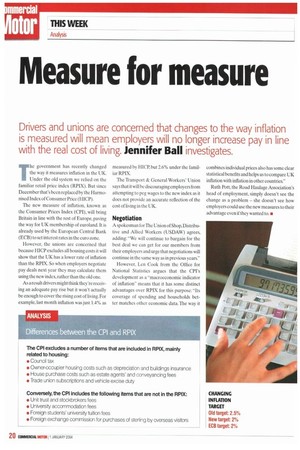Measure for measure
Page 20

If you've noticed an error in this article please click here to report it so we can fix it.
Drivers and unions are concerned that changes to the way inflation is measured will mean employers will no longer increase pay in line with the real cost of living. Jennifer Ball investigates.
The government has recently changed the way it measures inflation in the UK. Under the old system we relied on the familiar retail price index (RPIX). But since December that's been replaced by the Harmonised Index of Consumer Price (HICP).
The new measure of inflation, known as the Consumer Prices Index (CPI), will bring Britain in line with the rest of Europe. paving the way for UK membership of euroland. It is already used by the European Central Bank (ECB) to set interest rates in the euro zone.
However, the unions are concerned that because HICP excludes all housing costs it will show that the UK has a lower rate of inflation than the RPM So when employers negotiate pay deals next year they may calculate them using the new index, rather than the old one.
As a result drivers might think they're receiving an adequate pay rise built won't actually be enough to cover the rising cost of living. For example, last month inflation was just 1.4% as measured by HICP, but 2.6% under the familiar RPIX.
The Transport & General Workers' Union says that it will be discouraging employers from attempting to peg wages to the new index as it does not provide an accurate reflection of the cost of living in the UK.
Negotiation
A spokesman for The Union of Shop, Distributive and Allied Workers (USDAW) agrees, adding: "We will continue to bargain for the best deal we can get for our members from their employers and urge that negotiations will continue in the same way as in previous years."
However. Len Cook from the Office for National Statistics argues that the CPI's development as a "macroeconomic indicator of inflation" means that it has some distinct advantages over RPIX for this purpose: "Its coverage of spending and households better matches other economic data. The way it combines individual prices also has some clear statistical benefits and helps us to compare UK inflation with inflation in other countries."
Ruth Pott, the Road Haulage Association's head of employment, simply doesn't see the change as a problem — she doesn't see how employers could use the new measures to their advantage even if they wanted to. •












































































































































































